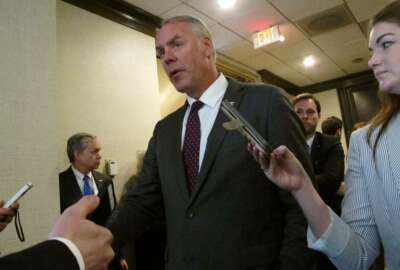

Months after filing a complaint about the Interior Department's practice of filling top political positions with non-career, temporary acting officials, a nonprofit...
Months after filing a complaint about the Interior Department’s practice of filling top political positions with non-career, temporary acting officials, a nonprofit representing federal and state employees says the legal authority of those appointees “remains murky.”
In February, Public Employees for Environmental Responsibility urged Interior’s Office of the Inspector General to look into what it considered “blatant violations” of the Federal Vacancies Reform Act.
More specifically, PEER took issue with the agency’s appointment of Fish and Wildlife Service Deputy Director Greg Sheehan, National Park Service acting Director Daniel Smith and the Bureau of Land Management’s Deputy Director for Policy and Programs Brian Steed.
A BLM bio identified Steed as “exercising authority of the director,” and an FWS bio said Sheehan “will serve as the Acting Director” until the Senate confirms President Donald Trump’s permanent pick for the job.
These acting officials are intended to only serve on a temporary basis, but Trump has yet to nominate anyone to serve as the permanent director for FWS or BLM. In August, Trump named Raymond David Vela as his choice for the National Park Service director.
“If they want to appoint acting directors, it requires them to go through some careful procedures, and in fact, the acting position has to be appointed by the president, not the secretary of the Interior,” PEER Senior Counsel Peter Jenkins said in an interview Friday.
In its original complaint to the OIG, PEER argued that appointing the acting officials ran afoul of the Federal Vacancies Reform Act, “which prevents the President from circumventing the constitutional advice and consent role of the U.S. Senate by simply appointing people to serve as ‘acting’ directors for long periods and completely bypassing Senate confirmation.”
In emails released by PEER on Sept. 12, Robert Cramer, GAO’s associate general counsel, said his agency would issue a report if any Interior official served in an acting capacity for longer than 210 days — the limit outlined in the Federal Vacancies Reform Act — but wouldn’t determine whether Interior Secretary Ryan Zinke had the authority to make those appointments in the first place.
“I want to let you know that as a result of a decision made here about a year ago, we plan to report, in accordance with our statutory mandate, only time violations of the act. We are not reporting violations of the Act based on an acting official’s qualifications to serve in that capacity. Thus any report we issue will not fully address all of the issues raised in PEER’s letter,” Cramer wrote to the Interior OIG on April 6.
GAO made this determination after the Interior OIG referred PEER’s complaint to the agency.
“We are inclined to think that GAO is in the best position to determine whether such an authority appears to be valid,” Bruce Delaplaine, the OIG’s general counsel, told Cramer in a Feb. 23 email.
Under the Vacancies Act, actions and decisions made by acting agency officials not complying with the law “shall have no force or effect,” as the Congressional Reseach Council noted in a July 20 report.
“The whole point of having a Senate confirmation process is that the public gets to comment on it, and the senators get to be involved and submit questions. As a result, you have a record for these people — you’ve got statements from them that you can later hold them to that will at least ground them a little bit in the realities of the world,” Jenkins said. “It’s just better to have an official that is known to the Senate and to the public, and has a track record, rather than these flying-under-the-radar type people who are running the show.
However, Zinke has also issued at least two memos, that would “temporarily redelegate authority” and “provide necessary decision making authority to presidentially appointed and Senate-confirmed positions across the Department of the Interior.”
“This order is intended to ensure uninterrupted management and execution of the duties of these vacant non-career positions during the presidential transition pending Senate-confirmation of new non-career officials,” Zinke wrote, adding that the order would only be in effect until the Senate confirms a permanent appointee.
However, Jenkins said it remains unclear if Trump intends to nominate anyone to permanently fill these roles.
“After two years, not even having an attempt to name a director of that agency and just relying on acting people appointed from state government is just very demoralizing to staff. They are not feeling empowered at all to carry out their jobs and are laying low,” he said.
In yet another twist, Sheehan stepped down from FWS in August.
Heather Swift, an Interior spokeswoman, referred to the agency’s previous statements on the issue, in which it said all three officials were deputy directors and not acting directors.
“PEER is either lying or doesn’t have a basic understanding of facts,” Swift told multiple news outlets in February.
Copyright © 2025 Federal News Network. All rights reserved. This website is not intended for users located within the European Economic Area.
Jory Heckman is a reporter at Federal News Network covering U.S. Postal Service, IRS, big data and technology issues.
Follow @jheckmanWFED

